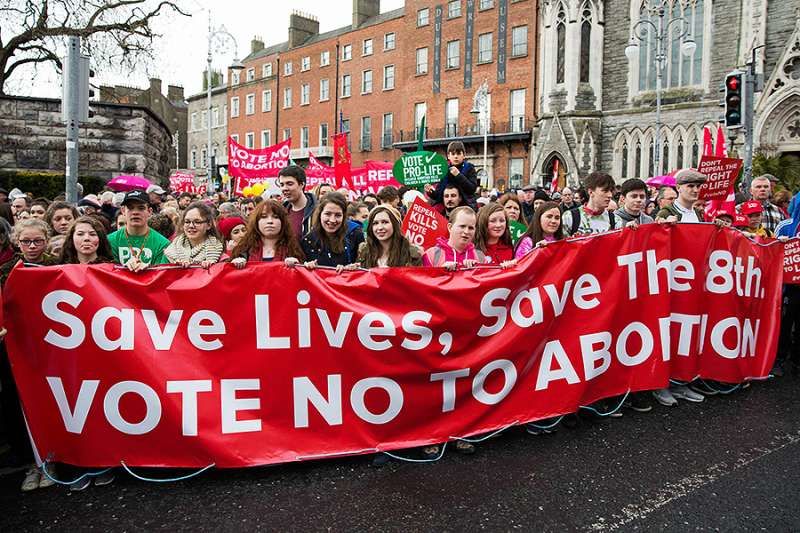Some 100,000 Irish pro-life advocates took to the streets across the country on Saturday to oppose legalizing abortion in the Republic of Ireland.
“Abortion has no place in a compassionate and progressive society,” Niamh Uí Bhriain, a spokeswoman for Save the 8th, said March 12.
“These huge numbers are a rising of the people against the media and political elites and against the powerful international abortion industry who have poured millions into a campaign attacking our pro-life laws. Ireland is at a defining point in our history, and we are challenging the people to reject the abortion industry and to demand a better answer for mothers and babies.”
In Dublin, thousands marched from Parnell Square to Merrion Square for the Rally for Life. Their signs said “Save Lives, Save the Eighth,” “Repeal Kills Vote No” and “Keep Ireland Pro-Life.” For social media, they promoted the hashtag #SaveThe8th.
“Ten weeks to ensure that the best of Irish people vote ‘No’ to abortion,” Uí Bhriain told the rally, the Irish Times reports. “Stand in the gap against the media and the international elites who think they could browbeat and bribe the Irish people into accepting the unacceptable, the killing of our own children, but who are to discover in that assumption that they were totally and utterly wrong. Because we know that in repealing the right to life there is no going back.”
The Eighth Amendment to the Republic of Ireland’s constitution, approved by 67 percent of voters in 1983, recognizes the right to life of mother and unborn child equally.
A referendum to replace that language is planned for late May. The Irish government’s replacement language reads: “Provision may be made by law for the regulation of termination of pregnancies.”
Taoiseach Leo Varadkar, the prime minister of the Republic of Ireland, has promised legislation to allow unrestricted abortion in the first 12 weeks of pregnancy if voters approve repeal.
Down syndrome activist Charlie Fien was among the speakers at Saturday’s rally in Dublin.
“Saving the Eighth will save the lives of babies with Down’s syndrome,” she said. “Ireland is one of the only countries in the world where babies with Down’s syndrome are safe inside their mother’s wombs.”
Uí Bhriain said the proposed change is an “extreme abortion referendum” that would be even more permissive than in Britain. She cited “heartbreaking facts” like the 90 percent abortion rate for babies with Down syndrome in Britain, saying that Fien’s call to protect disabled unborn children is “hugely important.”
Another speaker, general practitioner Dr. Judy Ceannt, cited doctors’ basic imperative to “do no harm.”
“We are not meant to intentionally kill or harm any patient, least of all the most helpless, the unborn baby. The government has no right to impose this on us,” said Ceannt, a relative of 1916 Easter Rising leader Eamonn Ceannt.
Destiny Herndon-De La Rosa, president of New Wave Feminists, told the rally that abortion is “the ultimate exploitation of women” and “a symptom of women’s oppression.”
“Ireland should lead the way by saving the Eighth,” she said.
Ireland has long been a pro-life and Catholic stronghold but in recent decades cultural changes have secularized the country and the Catholic Church continues to recover from sex abuse scandals and other difficulties.
There are also external forces seeking to change the country.
In August 2016, CNA broke the news that documents that had been reportedly hacked from billionaire financier George Soros’ Open Society Foundations and posted to the site DCLeaks.com included a strategy proposal targeting Ireland’s pro-life amendment by backing several pro-abortion rights groups. The documents caused legal problems for Irish pro-abortion rights groups, as they suggested they violated Irish laws against foreign political funding.
The foundations’ strategy suggested that a pro-abortion rights victory in Ireland “could impact other strongly Catholic countries in Europe, such as Poland, and provide much needed proof that change is possible, even in highly conservative places.”
Pro-abortion rights advocates have also cited the 2012 death of Savita Halappanavar, who was admitted to a Galway hospital while miscarrying. She reportedly asked for an abortion, which doctors refused because the baby still had a heartbeat. Halappanavar later died of a severe antibiotic-resistant infection following her miscarriage.
An inquest found multiple communications failures during her treatment while also recommending changes in guidelines for doctors to save the life of the mother.
Ahead of the repeal vote, the Irish Supreme Court unanimously ruled that unborn children have no other rights except those guaranteed by the Eighth Amendment. A lower court had sided with the argument that unborn children had personal rights guaranteed in other parts of the constitution as well as guarantees in the 2012 Children’s Referendum which requires the state to protect “all children.”
The Supreme Court claimed its decision does not mean the unborn child is “either constitutionally or legally invisible,” and said the state was entitled to take into account respect for human life “as an aspect of the common good.”
The Irish bishops issued a pastoral letter on March 9, “Two Lives, One Love,” discussing the right to life. Changing the Irish Constitution would serve no purpose other than to withdraw the right to life from some categories of unborn children, they warned.
“To do so would radically change the principle, for all unborn children and indeed for all of us, that the right to life is a fundamental human right,” they said.
All photos courtesy of the Save the Eighth campaign.

